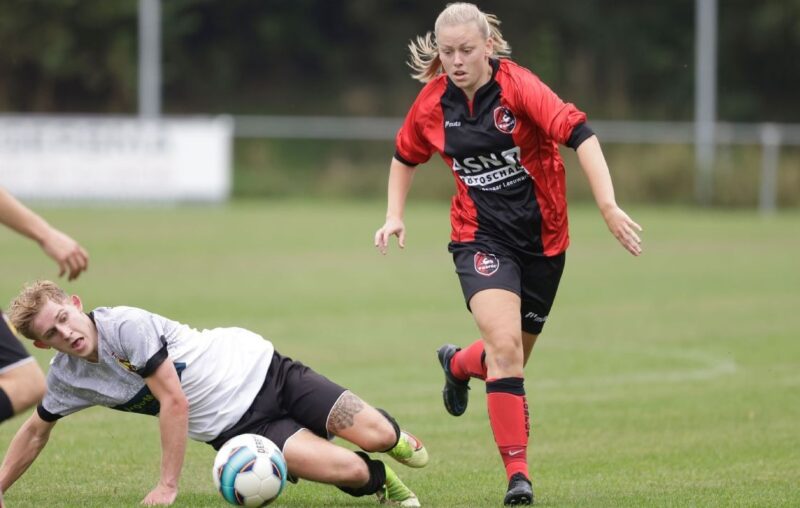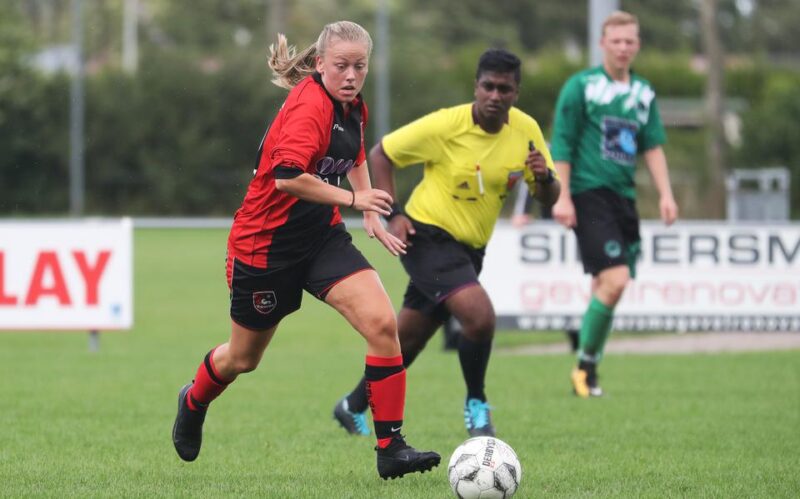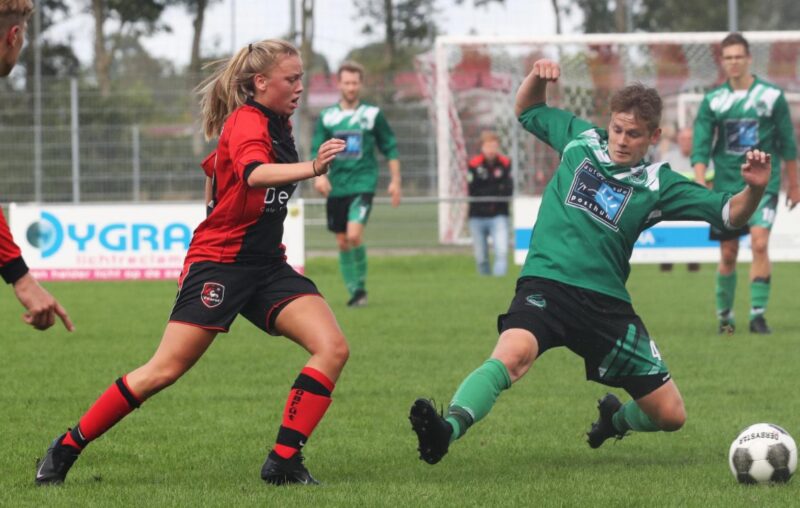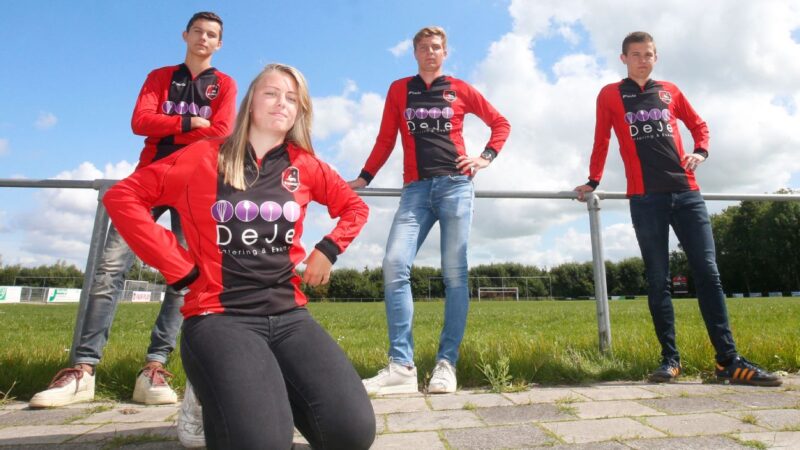Ellen Fokkema is a Dutch baseball player who made history in 2018 by playing for a men’s team. The Netherlands has never had a female professional athlete, but the country’s first ever woman to play on a men’s team was not deterred by gender discrimination.
Ellen Fokkema made Dutch history by playing for a men’s team. This is the first time that this has happened in the Netherlands.
Ellen Fokkema, a midfielder for VV Foarut, has a typical matchday routine: she rides her bike through the beautiful Friesland fields to the Schatzenburg sports complex in the small village of Menaam, in the north of the Netherlands (about 90 minutes north of Amsterdam), where she sees the same faces she’s known since she was five years old. But Saturday would be anything but ordinary, as the 20-year-old discovered she would start the club’s “4e Klasse” (ninth division) opener against Sleat from the bench. She’ll be playing for the senior men’s squad, not her regular U19 team.
She became the first professional woman to play for a senior men’s team in league play in the 60th minute.
– LaLiga, Bundesliga, MLS, FA Cup, and more on ESPN+ (U.S.) – Watch ESPN FC every day on ESPN+ (U.S. only) – Don’t have access to ESPN? Get immediate access
Thanks to Fokkema’s persistence, enthusiasm, and skill, the KNVB (Dutch Football Association) announced a change in eligibility criteria in May 2024, allowing women to participate in senior men’s matches. While mixed football is permitted at the youth level and in “category B” amateur teams, she had previously been denied the opportunity to play for a men’s team at a higher level. All of that changed when Fokkema was given the green light by her coach Janco Croes and went onto the field in front of approximately 150 fans to create football history.
Fokkema is accustomed to playing with and against males, as shown by the scars on her leg. Like her idol, Barcelona midfielder Frenkie de Jong, she searches for places where she can utilize her intelligence and quickness to gain an edge. “I play smart because I know I’ll never win unless I play smart,” she told ESPN.

The week leading up to the game was routine, with two training sessions crammed into her schedule around her academics. Despite her best efforts to make things as regular as possible, Fokkema recognized the importance of participating in Saturday’s match. She was working in the emergency room at the local hospital last Tuesday, with six months remaining until she qualifies as a nurse, but she’s since assisted in a seismic change in football.
“I suppose it’s a watershed moment for soccer,” Fokkema remarked. “Women will be allowed to select whatever team they want to play for… this is a first. I’m hoping I’m not the last, or otherwise it’ll all be for nothing.”
Fokkema began playing for VV Foarut when she was five years old. “‘Hey, there’s a lady!’ my opponents would exclaim when I was younger. However, since my hair was short, most people didn’t notice. I did that on purpose, hoping no one would see “she said Jenny and Marianne, Ellen’s sisters, also play football (her brother Auke tried it out but decided it wasn’t for him), having inherited their mother Klaske’s love for the sport.
Since she was a child, the community has been rooting for Fokkema. With a population of just 2,665, Menaam is a small hamlet where everyone knows everyone, and the local football club, VV Foarut, is a family atmosphere where everyone grows up together. Six of the guys she used to play with are still with her after 15 years; they were at her 18th birthday celebration, celebrating victories and picking apart defeats together. She became impervious to her opponents’ insults at this time.
“I used to take the free kicks, and when they went in, it used to really upset the opponents,” Fokkema adds. “They’d remark, ‘Hey, this isn’t ballet,’ but I’d outpace them the next minute, and it felt fantastic.” However, shortly before her 19th birthday, it seemed that she would no longer be allowed to play with her pals.
Fokkema began the game on the bench for the club for which she has been a member since she was five years old. Images by Soccrates for ESPN
The Dutch FA’s regulations prevented women from progressing to the senior men’s squad in the fourth division, which meant that those who had grown up with a single club would have to find a new team when they reached 19. It left Fokkema with two choices: play for the reserves with individuals she didn’t know, or go to a women’s team. She had had offers from Heerenveen’s professional women’s side, but she decided to focus on her medical studies and play with her pals instead.
“I wanted to be on the first team with them because I felt like one of them,” Fokkema added.

VV Foraut took note of this, and club official Auke Grijpma wrote to the KNVB in December 2019, requesting a special permission so Fokkema could continue playing in the men’s squad. They attempted again in February and wrote a third letter in March after receiving no answer the first time.
Roos Brouwer, a senior employee in the KNVB’s football development department, told ESPN, “I believe at first we [at the Dutch FA] didn’t really know what to do with the request.” “Because we wanted to find out how the rules were at the time, and I think people’s initial reaction was, ‘Let’s see how serious this request is, and whether they’ll continue and come back again.’”
They would ultimately react, with the KNVB announcing a trial program in August 2024 that would allow Fokkema to play for the men’s senior squad. As part of the trial, she made seven appearances for her club; a representative from the KNVB came to observe her and later questioned her about the experience.
“They’d also inquire as to how the opponents felt about it,” Fokkema adds. “They [the opponents] didn’t say anything to me after the game; all I received was a fist bump.”
Fokkema made history for VV Foarut when she came off the bench in the 60th minute. Images by Soccrates for ESPN
When another spike of COVID-19 cases forced the cancellation of amateur football in late October, the pilot program came to an abrupt end. “The upper level was my favorite. It’s everything a little quicker and a little more violent, but I prefer to play smart than rough.” According to Fokkema. “However, I like the companionship.”
The club filed a complaint with the KNVB, arguing that the trial should result in a permanent modification to Dutch football’s eligibility rules. The KNVB has few other instances to examine in the world of football. Women have previously received offers from professional men’s football clubs. In 2003, Perugia attempted to recruit German great Birgit Prinz, while in 2016, Calgary Foothills (of the USA’s fourth-tier Premier Development League) attempted to sign Canada women’s No. 1 Stephanie Labbe, but the league blocked the transfer. If the KNVB had decided against altering their qualifying criteria, it would have come as no surprise.
VV Foraut lost 4-0, but it was a good experience. ‘I still have no idea how huge this is,’ Fokkema said to ESPN. Images by Soccrates for ESPN
The KNVB then convened a Microsoft Teams conference with Fokkema and her club in early May 2024. They had gone through all of the information and decided that she should be allowed to play with her pals again.

Throughout the pilot, Brouwer said, “we monitored her during practice matches, cup matches, and league matches, and there was not a single reason not to do it.” “So we gave it our blessing, but we’re still keeping an eye on it. The most essential aspect is that ladies may play football in a secure environment.”
They devised a strategy for dealing with the expected influx of media attention, and on May 11, KNVB director of amateur football Jan Dirk van der Zee issued the following statement: “We no longer see any reason to follow this [previous rule] and instead opt for equality and diversity, based on current information and recent research findings. We want girls and women to be able to find an appropriate position in the football world based on their own abilities and goals.”
In the Netherlands, there were around 150 women playing B-Category football (a level of teams mostly made up of the reserves of senior men’s clubs), but Fokkema had altered the game. Women would no longer have to apply to play.
Fokkema hopes that now that she’s made her first official appearance, other women will follow in her footsteps since there’s no longer a barrier stopping them from playing at that level. Images by Soccrates for ESPN
“When it was revealed, I realized how big of a thing it was,” Fokkema said. “Before, I assumed it would be the same as it was, just me playing soccer.” “However, I was then featured in the news. It was a weird experience. I wanted to hurl my phone out the window because it was so hot! But it was hectic for one day, then a week, and then everything settled down.”
She played a handful of preseason games and three cup games leading up to Saturday’s game, but the encounter against Sleat was a watershed moment. VV Foarut lost 4-0 in the end, and Fokkema acknowledged that she will need to play a few more games before she can call it a “success.” She found the TV cameras odd and the attention perplexing, but she was ecstatic at the potential effect of her presence.
According to ESPN, the results of the KNVB have already piqued the attention of German and English officials. Women playing professional men’s football is unlikely in the foreseeable future, according to the KNVB, but “it isn’t completely impossible.”
While Fokkema believes that this event would encourage others to “just keep being yourself,” she just wants to keep playing football for the club she loves. “I still have no idea how huge this is,” she says. “I’m still convinced that I’m simply having fun with my pals. There isn’t much of a difference for me. However, I can see a lot of change all around me.”



